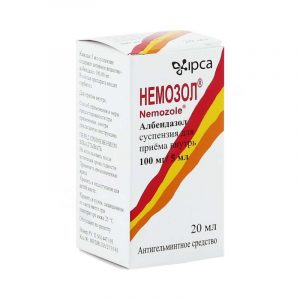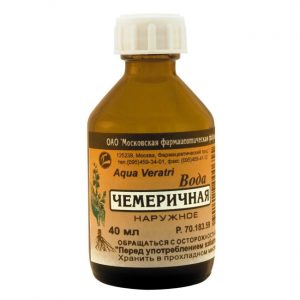Description
Packing
2 pcs
Pharmacological action
Levamisole is an anthelmintic drug. Acting on ganglion-like formation of nematodes, Decaris causes depolarizing neuromuscular paralysis of the membrane of the helminth muscles, blocks succinate dehydrogenase, inhibits fumarate dehydrogenase, disrupting the course of helminth bioenergetic processes. Thus, paralyzed nematodes are removed from the body by normal intestinal motility within 24 hours after taking the drug.
Pharmacokinetics of
Levamisole, when taken orally at a dose of 50 mg, is rapidly absorbed from the gastrointestinal tract. The maximum plasma concentration is determined on average 1.5-2 hours after taking the drug. Levamisole undergoes intensive metabolism in the liver, its main metabolites are p-hydroxy-levamisole and its glucuronide.
T1 / 2 is 3-6 hours from the body. Less than 5% is excreted unchanged by the kidneys, less than 0.2% of the administered dose through the intestines.
Indications
Helminth infections Ascaris lumbrocoides, Necator and Americanus Ancylostoma duodenale.
Contraindications
Agranulocytosis caused by drugs (history).
Children under 3 years old.
Breastfeeding period.
150 mg tablets are not prescribed for children.
Precautions: patients with renal and / or liver failure, with inhibition of bone marrow hematopoiesis.
Use during pregnancy and lactation
Prescribing during pregnancy is only possible if the intended benefit to the mother outweighs the potential risk to the fetus.
If you need to use the drug during breastfeeding, you should decide on the termination of breastfeeding.
Ingredients
1 tablet contains:
Active ingredient:
levamisole hydrochloride – 59 mg, which corresponds to the content of levamisole – 50 mg
Excipients:
corn starch,
sodium aromatic srd, sodium sulphate, srd stearate,
dye sunny sunset yellow (E110).
Dosage and administration of
Adults: 1 tablet 150 mg is prescribed once.
For children aged 3 to 6 years (10-20 kg): 25-50 mg (0.5-1 tablet of 50 mg) once.
For children aged 6 to 10 years (20-30 kg): 50-75 mg (1-1.5 tablets of 50 mg) once.
For children aged 10 to 14 years (30-40 kg): 75-100 mg (1.5-2 tablets of 50 mg) once.
The drug should be taken after meals with a little water in the evening. There is no need for laxatives or a special diet. If necessary, the drug can be repeated after 7-14 days.
Side effects
Headache, insomnia, dizziness, palpitations, cramps, dyspepsia (nausea, vomiting, abdominal pain, diarrhea).
There are reports of the development of side effects from the central nervous system (encephalopathy) 2-5 weeks after taking the drug, as well as allergic reactions (skin rash), seizures.
In most patients, these effects were reversible, and early use of glucocorticosteroid therapy improved prognosis.
The association of these symptoms with the use of Dekaris is not entirely convincing. With the use of large doses or with prolonged therapy, leukopenia, agranulocytosis, and tremor can be observed.
Drug Interaction
Co-administration of pentalgin with barbiturates, tricyclic antidepressants, rifampicin, ethanol increases the risk of hepatotoxic action (these combinations should be avoided).
Paracetamol enhances the effect of indirect anticoagulants and reduces the effectiveness of uricosuric drugs.
Prolonged use of barbiturates reduces the effectiveness of paracetamol.
Concomitant use of paracetamol with ethanol increases the risk of acute pancreatitis.
Microsomal oxidation inhibitors (including cimetidine) reduce the risk of hepatotoxic action of paracetamol. Decaris increases the level of phenytoin in the blood, therefore, with their simultaneous use, it is necessary to control the level of phenytoin in the blood.
Decaris cannot be used concurrently with lipophilic agents such as tetrachloromethane, tetrachloroethylene, henopodium oil, chloroform or ether, as its toxicity may be increased.
overdose
Symptoms: With the introduction of a large dose of levamisole (over 600 mg), the following signs of intoxication were described: nausea, vomiting, drowsiness, convulsions, diarrhea, headache, dizziness, and confusion.
Treatment: in case of accidental overdose and if after the administration of the drug has not passed much time, gastric lavage is performed. Monitoring of vital functions of an organism and carrying out of symptomatic therapy is necessary. In the presence of signs of anticholinesterase action it is possible to enter atropine.
Storage conditions
Store at 15-30 ° C.
Keep out of the reach of children.
Expiration
5 years.
pharmacy terms and conditions for prescription
dosage form srdl kp Dosage form
tablets
Gideon Richter, Vengriya



